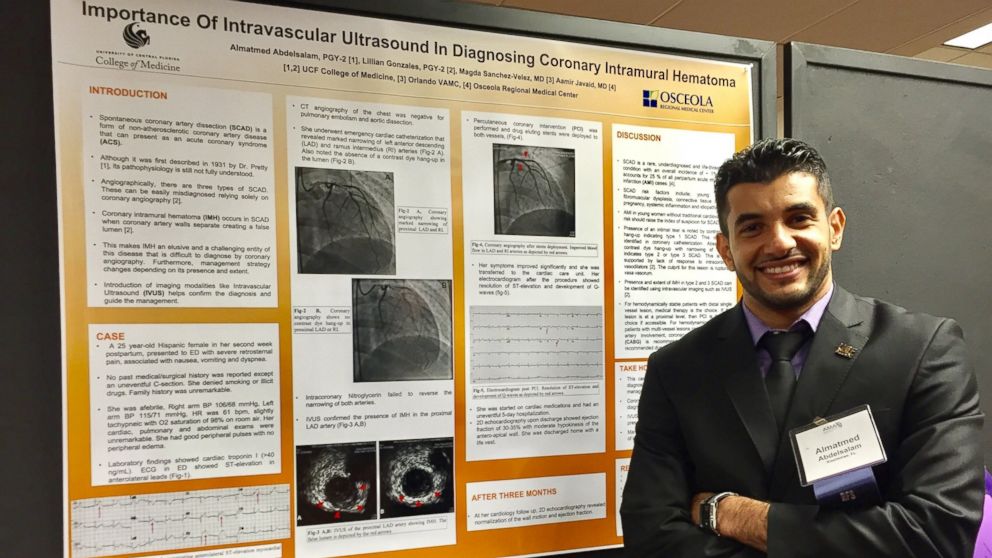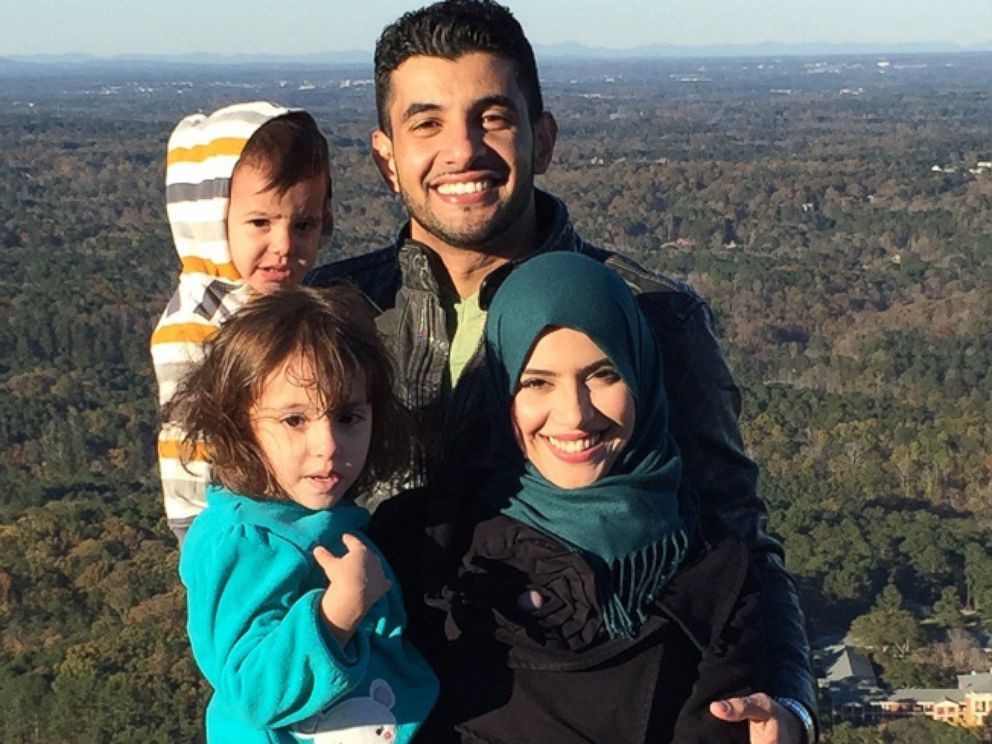Foreign doctors filling shortages, communities who need them uncertain amid visa changes
A physician in rural Macon, Georgia is uncertain about his future in the U.S.

— -- A few months ago, Almatmed Abdelsalam was busy looking for a home for his family of four in the modestly-sized city of Macon, Georgia, eager to settle down after securing a job as a physician.
The city is one of the many rural and urban areas that face a severe shortage of doctors, a burden that has been relieved by foreign doctors allowed to stay in the U.S. to help. Thanks to this special visa waiver program, Abdelsalam expected to join the estimated 1,000 international physicians each year who opt to work in underserved communities across America.
However, on April 3rd, the United States Citizens and Immigration Services (USCIS) temporarily halted fast-track processing of visas for foreign doctors.
Now, with only 30 days left to obtain new visas, Abdelsalam and nearly a thousand other foreign doctors are racing against the clock, wondering whether they will have a place in the U.S. And the hospitals and communities are also waiting, uncertain if the physicians they need will arrive at all.
Abdelsalam was a practicing physician in Benghazi, Libya, until 2010. He was nominated by his government to pursue a master's degree in microbiology in the U.S. But months after he left, the Libyan government collapsed during the Arab Spring.
In the six years since, Abdelsalam has built a new life here, including a return to medicine. He will finish his residency in internal medicine at the University of Central Florida this June.
Abdelsalam started applying for a special waiver through the Conrad 30 waiver program almost 16 months ago, so he and his family could continue to live in America after his training.
The U.S. has long been grappling with a physician shortage, gaps disproportionately filled by international medical graduates. The Conrad 30 program allows each state to exempt up to 30 foreign physicians per year from having to return to their home country after training in the U.S. The J-1 visas that many foreign doctors rely on expire on July 1, after they have finished their medical residencies or fellowships.
In exchange for visa waivers, doctors who receive the exemption are required to work in communities suffering a doctor shortage for at least three years. The waiver application process begins in the fall and involves approvals from the relevant state health department, the Department of State, and the USCIS. Doctors receive the waiver the following spring.
But the process has been disrupted. President Trump’s recent executive orders threw Abdelsalam’s life into disarray. His waiver request moved to the Department of State the day before the first order was signed, but only cleared in early April said Abdelsalam.
“If I was applying last year, I would’ve said it’s a done deal,” he said. “It’s usually a formality to get the rest of the approvals once you’ve had your application approved by the state [health department]. But now, given these circumstances, it’s much more difficult.”
Usually, once the waivers are approved, foreign physicians then need to get H1-B visas to continue living in America legally -- a process that in the past took about two weeks. However, with the USCIS suspending premium processing for these visas, these applications are no longer receiving expedited review.
According to the USCIS, suspending the program will allow the organization to process a backlog of petitions.
“This temporary suspension will help us to reduce overall H-1B processing times,” they said. “We will be able to process long-pending petitions, which we have currently been unable to process due to the high volume of incoming petitions and the significant surge in premium processing requests over the past few years.”
Instead, many foreign doctors will now have to wait anywhere from eight months to more than a year, according to Jennifer Minear, an immigration attorney from the American Immigration Lawyers Association.
“Uncertainty has been the theme of the past six months. Time is not on my side,” said Abdelsalam. “It’s not like I can wait for eight months or go practice elsewhere during those eight months. I don't get temporary status to work while they take their time to process.”
The Conrad 30 program brings physicians like Abdelsalam to communities like Macon, a small city of about 90,000 located in a county where nearly 30 percent of its residents are living below poverty level. The primary care available in Macon is the equivalent of just three full-time primary care doctors.
Abdelsalam expects he would see about 20 patients a day, working 20 days a month caring for as many as 4,800 patients a year.
By definition, Macon, like other designated health professional shortage areas, has about 3,000 patients for every practicing physician -- double the ideal patient-provider ratio, according to Connie Berry, a former manager at the Texas Primary Care Office.
The program has brought over 15,000 physicians to these areas over the last 15 years, according to a statement from Senator Amy Klobuchar D-Minn, a champion of the Conrad 30 program.

For Abdelsalam, the ritual of patient care is one of connection and breaking down barriers.
“A person like me, coming from my country, and to be an effective health care provider, defeats ideas people have of the Middle East,” he said. “Together, we’ve found a common language in health care, and from taking care of them, I learn from them. When you go through this, you feel more comfortable, you feel that you belong, you feel that you have a place here.”
Once these doctors come, they tend to stay -- the Rural Health Research Center found that 55 percent to 80 percent of doctors who received J-1 waivers intend to keep practicing in their communities past their commitments.
But Abdelsalam, like others in the program, may not have that choice. If he doesn't receive both his waiver and visa by July, he will likely have to leave the country.
“We are interested in giving back to America, a country that took us in, and having a life that we envisioned here," he said. "It’s a choice, it’s more than six years that I’ve spent here. They do matter, it’s not just a period of time."
"I came here first, intending to go back, but with everything that happened in my country —- it’s a vacuum over there of terrorist groups, an unsettled country -- it’s not an option. I consider the U.S. my home away from home now. It’s not easy to give up, and it’s not fair to my kids who were born here.”
Physicians like Abdelsalam have few options. If they leave, they must apply for a separate visa to return to the U.S. and recent directives suggest that they will be subjected to stringent screening criteria at the discretion of a consular officer.
“The suspension affects everyone applying for an H1-B visa,” said Minear. “With the J-1 [visa], you’re expected to return home, and if you don’t have the waiver and you don’t have the H1-B you’re expected to leave, no matter where you’re from, whether that’s some place like Syria or Belgium.”
Abdelsalam is hopeful that he and other physicians could qualify for the “national interest” criteria for expedited approval for his H1-B —- a loophole in the processing suspension.
But Minear says that this is uncharted territory. It is unclear whether this strategy will be successful given the subjective, case-by-case review process.Despite letters submitted on his behalf from his lawyer and employer, Abdelsalam still has not received any word on whether he will be approved for expedited approval.
“I’m approaching the final 30 days of my current J-1 visa duration, it’s becoming very uncomfortable,” he said. “It’s a dreadful wait is all I can say.”
With the days slipping away, Abdelsalam is reflecting on his role and opportunities to work as a doctor in the U.S.
“We’re willing to work here for a minimum of three years to take care of people, especially in underserved areas and providing care for veterans," he said. "If even we are not good enough to come to America, then who will be?"